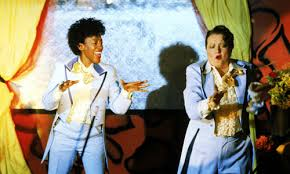a light in the sky
by Douglas Messerli
Percy Aldon (screenwriter and
director) Bagdad Café / 1987
Despite my description of this film
as being a “Romanization” of the US West, Percy Aldon’s comedy Bagdad Café begins in a kind of hell, a
sad world in which the German couple visiting the U.S. Mojave desert play out
the breakdown of their relationship before our eyes. The husband (Hans
Stadbauer) is obviously a slob, a selfish man who is drunk in the middle of the
desert. The wife, played brilliantly by Aldon’s earlier find, Marianne
Sägebrecht—a plump, corseted woman who could only be found in Germany’s
Bavaria—is frustrated by her husband’s boorish behavior, determining then and
there to leave him, pulling her oversized suitcase from the trunk, and trudging
ahead through the desert sands, as he goes spinning off down the highway.
Miraculously, she finds her way to the only nearby stop, the Baghdad
Café (in reality, the Sidewinder Café of Newberry Springs, California), where
upon greeting the scowling and unfriendly face of the Café-gasoline stop’s
owner, Brenda (a spirited C. C. H. Pounder)—who can hardly believe the sudden
appearance of the overweight stranger—she faces what stands in for a Western
stand-off, the viewer almost convinced that it is all a joke. Yet the German
woman, Jasmin, offers payment in the form of traveler’s checks, and the
transaction is culminated, not without some further doubts in Brenda’s
unfathoming mind. It is not so much that the black truckstop owner is bigoted
as she is completely out of her element, having never encountered a figure such
as Jasmin before in her life. Similarly, Jasmin, who has obviously encountered
flew blacks in her travels, is slightly terrified by the questioning sentinel
who sits before her.
Just as Jasmin—who quickly
discovers that the suitcase she has pulled from the car trunk contains not her
clothes, but her husband’s—Brenda is on the verge of a breakdown, which her
husband, Sal (G. Smokey Campbell) recounts for the film’s viewers as he watches
her through binoculars. Even little things irritate her, the new guest’s
attention to her Bach-playing son, Salomo (the musically gifted Darron Flagg),
and Jasmin’s gentle friendship with Brenda’s daughter, Phyllis (Monica
Calhoun). Finally, she explodes when she travels into town for a few hours for
supplies, and Jasmin becomes determined to present her with a wonderful gift by
completely cleaning up—and out—the mess of junk and paper that fills the
chaotic gas-station office. Furious with the utter transformation, she demands
that this German Hercules return all of her “shit” to this “Augean Stables.”
The impossibility and ridiculousness of the task forces her to rethink her
command as, with the compliments of passing customers and visitors, she
suddenly is proud for the changes made in her life.
Aldon’s film turns from a depiction of a dry desert spot to a world of
glorious sunsets, stunning neon displays and strange displays of light in
A visit from the local sheriff Arnie (native American Apesanahkwat)
reveals that Jasmin’s visa has expired, and suddenly she is sent off from this
rustic paradise to return to Germany. For a long period of the film,
accordingly, things fall into stasis, as the sad citizens of this outpost are
forced to simply wait day in and out, accompanied by the only sound to be
heard, Eric’s boomerang, itself symbolic of the circular pattern of their days,
but also, potentially, of return and resurrection. As the bartender Cahuenga
(George Aguilar) tells truckers who ask “Where are the ladies?”: “Everyone has
gone. They’ve all gone.”
If Bagdad Café is highly
unbelievable, it is still a highly satisfying romance.
Los Angeles, May 9, 2014
Reprinted from International Cinema Review (May 2014).








No comments:
Post a Comment